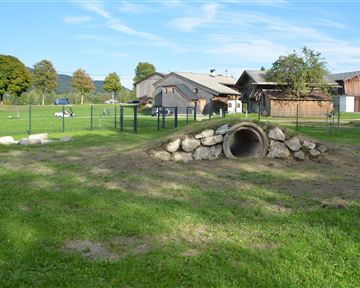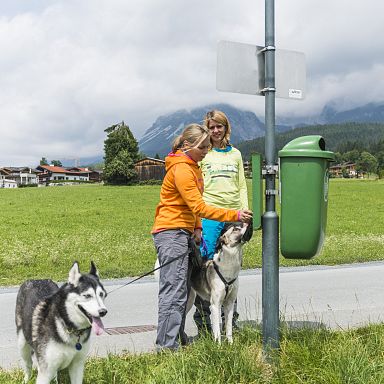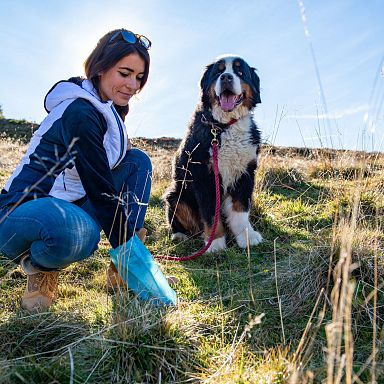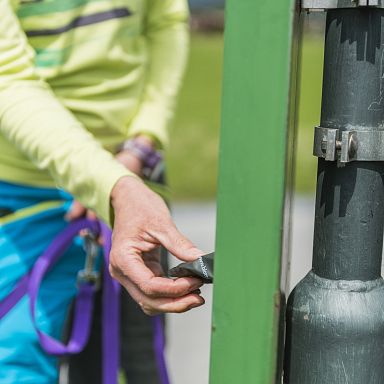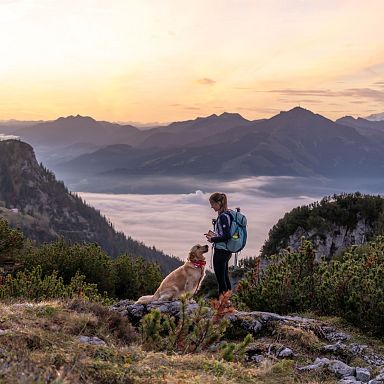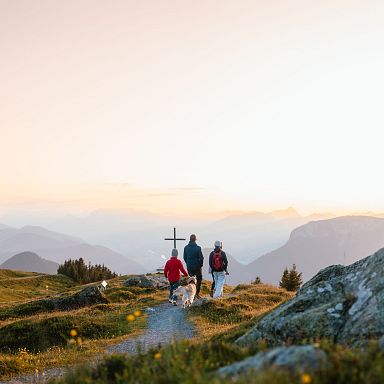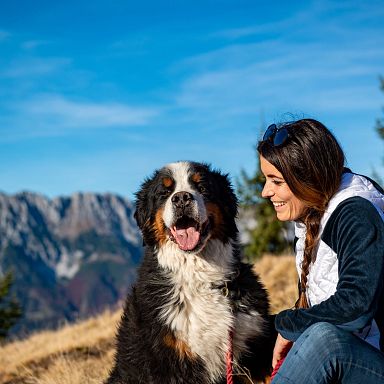Tips and rules for dogs
All information for a successful holiday with your dog at the Wilder Kaiser
We look forward to welcoming you and your four-legged companion to the Wilder Kaiser. To help you make the most of your holiday with your dog, we have summarised the most important behavioural guidelines and regulations here. You will also find useful information on swimming with dogs and excursion ideas for dog owners. In the four Kaiser villages of Ellmau, Going, Scheffau and Söll, the standard rules for dogs and their owners apply. These primarily concern the proper disposal of dog waste and the requirement to keep dogs on a lead in certain areas.
1 Leash obligation
1) Dogs must be kept on a leash no longer than two metres in Söll and no longer than three metres in Going
a. in public facilities such as public transport (e.g. Kaiserjet) and generally accessible buildings, parks and other generally accessible facilities,
b. on the hiking trails marked with red colour in the annex to this ordinance (overview map of the municipality).
2) Service dogs of public offices as well as hunting and rescue dogs are exempt from the leash requirement during their intended use.
2 Obligation to remove dog faeces from the entire municipal area
1) Dog owners and all persons who walk dogs in public must ensure that the entire municipal area (in particular agricultural areas, green spaces, children's playgrounds and traffic areas) is not contaminated by dog faeces.
2) The owners or custodians of dogs are obliged to remove the soiling caused by their dogs immediately and to dispose of it in waste bins.
3 Penal provisions
1) Violations of § 1 Para. 1 of this ordinance constitute an administrative offence and are punishable by a fine in accordance with § 8 Para. 1 lit. d of the Provincial Police Act by the authority named in § 23 Para. 2.
2) Violations of § 2 of this ordinance constitute an administrative offence, provided that the offence does not constitute a criminal offence falling within the jurisdiction of the courts and is not already subject to prosecution under the StVO, and are punishable by a fine by the mayor in accordance with § 18 Para. 2 of the TGO.
§ 4 Entry into force
This ordinance shall enter into force at the end of the day on which it is posted on the official notice board. At the same time, the previous ordinance shall cease to apply.
Announcements and leash regulations for Ellmau, Going, Scheffau and Söll
Leash obligation on the Wilder Kaiser
We always keep our dogs on a lead in summer and winter on all hiking trails, in the village centre and near grazing areas. In this way, we ensure safe interaction between people and animals. Dogs must be kept on a lead on almost all paths in the region, and this is enforced. Non-compliance can be penalised with a fine of up to €2,000.
Dogs must also be kept on a lead and muzzled in all public areas such as public transport, childcare and school facilities, play areas and shopping centres.
Tip
Everything firmly under control?
Did you know that a lead not only means safety for you, but also for your dog and contributes significantly to a relaxed walk? New surroundings also mean getting to know your dog anew! New smells, new friends, new animals - that means a lot of excitement and a lot of sniffing. However, this can also stimulate the innate hunting instinct in trained dogs.
Cast off - free run for your pets
The dog meadows and dog miles at the Wilder Kaiser and the surrounding area are ideal for your dogs to let off steam and enjoy playful encounters with other dogs. The designated exercise areas are ideal for letting your four-legged friend run free. Please note that dog faeces must also be collected there so that the next dog owners will find the area just as beautiful. All the exercise areas listed can be used free of charge and without registration.
- Dog mile in Söll along the Stampfangerbach stream
For committed dog owners, it is a matter of course to pick up dog faeces with a "dog waste bag" and dispose of it in the nearest waste bin. In rural areas, this is a legal requirement for all public areas (streets, squares, pavements, parks and green spaces, children's playgrounds, sports facilities, bandstands, etc.) and also for all agricultural areas.
In the Wilder Kaiser region, there are therefore dog waste bag dispensers and rubbish bins on almost all walking and hiking trails. However, if a poo is left lying around, you will be fined. The obligation to pick up dog faeces applies always and everywhere!
Did you know that...
- Dog faeces can cost other animals their lives?
- Cows in particular are at risk. They eat the faeces, which contain bacteria and parasites that can lead to stillbirths or even kill the cow itself.
- Wild animals also suffer from this. They eat the dog faeces that are deposited in the poo bags, which in turn poses a danger to wild animals.
Let's look after the healthy coexistence of our animals together by using a free poop bag, picking up the poop and throwing it in the nearest rubbish bin. Help us to make the Wilder Kaiser a great place for animals to live together !
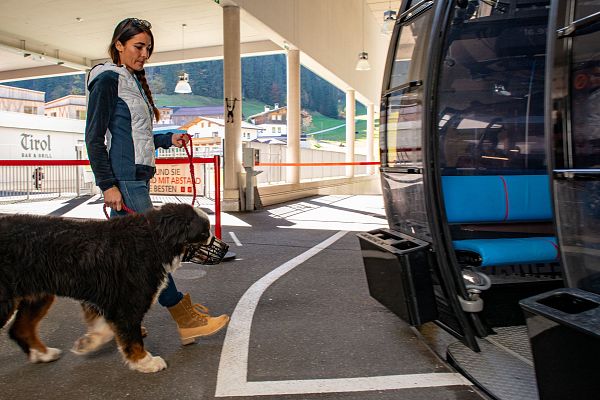
In the Wilder Kaiser region, you can also use the mountain lifts with your dog.
You can of course take your four-legged friend on a lead on all regional buses and also on the free KaiserJet hiking and bathing bus. Please note that your dog must wear a muzzle when travelling.
You can also use the cable cars in the region with your dog. The Ellmau - Going cable car costs € 6.00 per day and dog, in Scheffau and Söll your dog travels free of charge. Dogs must be kept on a lead and wear a muzzle if necessary.
If you are travelling by train, you can take your dog into the compartment with a dog ticket. Dogs must be kept on a lead and muzzled on the train. Small dogs travelling in a dog crate travel free of charge.
On hot summer days, a dip in the mountain stream will cool your four-legged friend down. Please note that the lakes in the region are not suitable for refreshing dogs. If you still want to treat your dog to an extensive lake bath, you will find suitable alternatives here:
Refreshment is also provided for dogs
- Gieringer pond
- Dog pool behind the Stöcklalm at Hexenwasser
- Dog beach on the eastern shore of Lake Walchsee
- Designated dog areas at Pillersee
Tip
Don't forget the water!
If you are planning a hike, please remember to take enough water with you for your four-legged friend. Not all hiking trails have enough drinking water for dogs in the form of mountain streams.
As the region has plenty of sporting activities to offer, it is also frequented by keen sportspeople and nature and animal lovers. This can lead to risky situations for the dogs as well as for other people. Many paths on the Wilder Kaiser are used by different sportspeople at the same time, so we ask you to use a short lead. Otherwise there is a risk of cyclists overlooking the lead and causing serious accidents that could be fatal for the dog, the dog owner or the cyclist.
Even in winter, extensive hiking trails invite you to go for a walk or a stroll. As these run parallel to the cross-country ski trails, special attention must be paid to the compulsory use of a lead. The winter paths also lead across meadows where cows graze in summer. Dog faeces in the meadows can lead to stillbirths in the cows. It is therefore essential to use the "dog waste bags" and rubbish bins located at the crossroads.
The Wilder Kaiser is a nature reserve that is home to many wild animals and their young. We live here with a variety of animal species and want to preserve the diversity of species in the Wilder Kaiser nature reserve. The hunting instinct can make dogs sprint! This stress can cost wild animals their lives. Incidentally, this can also be dangerous for dogs, as forest dwellers are more adept at climbing in steep mountains than dogs.
We work together to ensure that wild animals and dogs live safely together and therefore keep our dogs on a lead.
"...By doing so, you are helping to ensure that our wild animals are not disturbed and unnecessarily disturbed in their "living room"." (Martin Wieser - Hunting Manager Südkaiser)
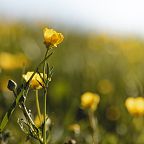
Do you already know the flora and fauna of the Wilder Kaiser?
If not, you'll find lots of exciting background information about the nature reserve and its animal inhabitants here.
Packing list: Holidays with a dog - what do you need to take with you?
- EU pet passport or international vaccination certificate
- Liability insurance number
- Dog lead, possibly muzzle
- Sleeping blanket, favourite toy, brush
- Ready-made food, treats, water and food bowl, possibly a spoon
- For travelling: Water bottles
- Old towels in case it gets wet or dirty
- For long hikes and tours at the holiday destination: possibly dog shoes
- First-aid kit: tick tweezers, iodine solution for disinfecting wounds, wound ointment, possibly travel tablets, bandages

